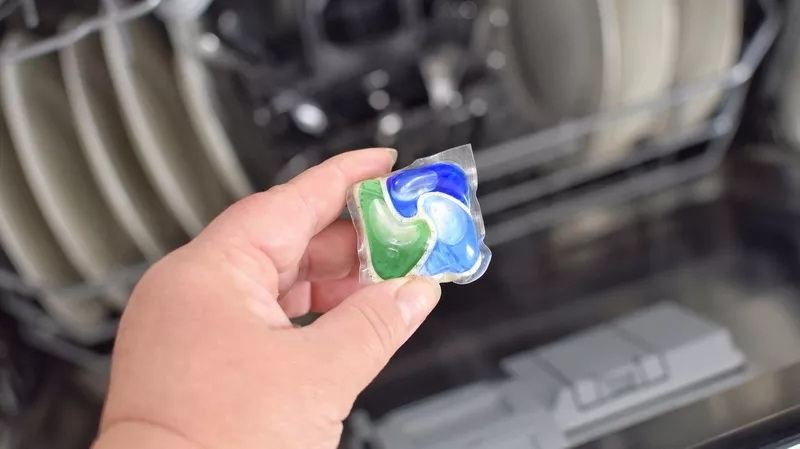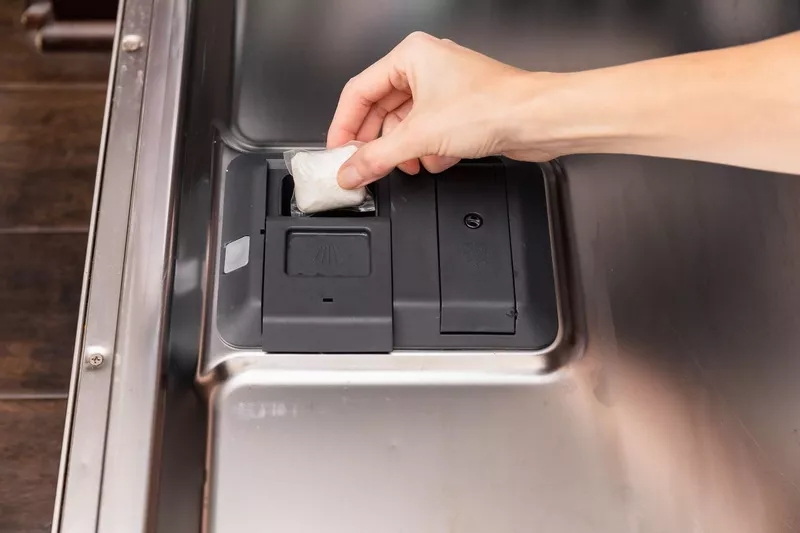Dongguan UFine Daily Chemical Co.,Ltd.
- All
- Product Name
- Product Keyword
- Product Model
- Product Summary
- Product Description
- Multi Field Search
Views: 222 Author: Tomorrow Publish Time: 11-18-2025 Origin: Site











Content Menu
● How Garbage Disposals Actually Work
● Ingredients and Function of Dishwasher Pods
● Why Dishwasher Pods Are Unsafe for Garbage Disposals
>> Motor Strain and Overheating
● Common Myths About Garbage Disposal Cleaning
● Recommended Methods for Cleaning a Garbage Disposal
● Specialized Disposal Cleaners
● Preventive Maintenance Tips for Daily Use
● What to Do If You Already Used a Dishwasher Pod
● Environmental and Plumbing Considerations
● Comparison: Dishwasher Pods vs. Proper Disposal Cleaners
● Professional Maintenance and When to Call for Help
● FAQ
>> 1. Can I use liquid dish soap instead of a pod to clean my garbage disposal?
>> 2. How often should I clean my garbage disposal?
>> 3. Are commercial garbage disposal cleaners septic-safe?
>> 4. What if my disposal still smells bad after cleaning?
>> 5. What food waste should never go into a garbage disposal?
Garbage disposals are among the most useful appliances in modern kitchens. They handle food scraps quickly, minimize waste, and keep sinks cleaner. However, it's common for homeowners to wonder whether household cleaning products such as dishwasher pods can be used to clean or deodorize garbage disposals.
At a glance, tossing a dishwasher pod into the disposal might seem convenient. After all, dishwasher pods clean dishes excellently, leaving them spotless and fresh. But the mechanisms and operating environments of dishwashers and garbage disposals are completely different. Using a pod in a disposal can cause more harm than good.
This article explores the details behind this topic—how garbage disposals work, what's inside dishwasher pods, the potential hazards, safer cleaning alternatives, and proper maintenance strategies.

Understanding how your garbage disposal functions helps explain why certain cleaning products are unsuitable.
A garbage disposal is installed under the kitchen sink and connected to the drain. When turned on, an electric motor spins a grinding plate equipped with small impellers. These impellers push food scraps against a stationary ring, breaking them into tiny particles small enough to flow through pipes with running water.
Importantly, garbage disposals do not store or circulate water. They simply grind waste and flush it away. This means cleaning agents or detergents do not circulate or rinse off as they would in a dishwasher. Any detergent that foams or leaves residue can get trapped inside, potentially damaging the system.
Dishwasher pods are formulated for automatic dishwashers, not open-flow grinding systems. They are powerful, concentrated cleaning capsules designed to dissolve slowly under high water pressure and temperature. Most pods contain the following components:
- Surfactants: Help lift grease and loosen food particles.
- Enzymes: Break down proteins and carbohydrates.
- Bleaching agents: Sanitize and whiten dishes.
- Polymers and binding agents: Keep the pod stable and evenly distributed.
- Rinse aids: Prevent water spots during drying cycles.
These ingredients are excellent for washing plates and glassware but can create significant problems in a garbage disposal environment where there is no full rinse or filtration process.
Dishwasher pods contain concentrated chemicals. Because a disposal operates for only seconds with minimal water, most of the detergent remains undissolved and stuck on the metal surfaces or rubber gaskets. Over time, this residue can react with moisture, corroding parts or weakening rubber seals.
Surfactants inside pods produce foam to help clean dishes. In a disposal, that foam has nowhere to go, potentially causing it to bubble up through the sink drain. Foam buildup can lead to slow drainage, unpleasant odors, and minor flooding in some cases.
Some pods are engineered to dissolve slowly in hot water. When inserted into a disposal, pieces can lodge between the impeller blades or stick to the grinding chamber, forcing the motor to work harder. This increases the risk of overheating or jamming.
A dishwasher pod's cleaning efficiency depends on long wash cycles and hot water exposure. A garbage disposal uses neither, making a pod nearly useless. The pod might deodorize temporarily but won't remove residues or grease effectively.
Many household cleaning hacks circulate online, and not all are safe or effective. Let's address some common misconceptions:
1. Myth: Dishwasher pods clean and sharpen disposal blades.
- Fact: Garbage disposals do not have blades—they have impellers. Dishwasher pods may coat them with waxy residue that dulls their grinding efficiency.
2. Myth: Bleach cleans and sanitizes the disposal.
- Fact: While bleach kills bacteria, it can corrode metal parts and degrade rubber components. It also produces toxic fumes when mixed with organic debris.
3. Myth: Hot water helps grease wash away.
- Fact: Hot water melts grease temporarily, but once it cools in the pipes, it solidifies and causes clogs. Always use cold water when running the disposal.
Dispelling these myths ensures homeowners maintain appliances the right way without accidental damage.
If you want a fresh-smelling and properly functioning disposal, several tried-and-true cleaning methods work well without using dishwasher pods.
Pour two cups of ice cubes and one cup of rock salt into the disposal. Run cold water while turning it on. This combination scrubs the chamber mechanically, breaking up hardened debris and removing food buildup on the grinding components.
This natural cleaning duo is one of the safest options. Pour half a cup of baking soda into the drain, followed by a cup of vinegar. Allow the fizzy reaction to break down grime for five minutes, then rinse with warm water. It cleans and deodorizes without harsh chemicals.
Drop small pieces of orange, lemon, or lime peel into the disposal and run it briefly with cold water. The natural oils dissolve grease, leave a pleasant scent, and provide a light cleaning effect.
Running plenty of cold water for about 20 seconds before and after each use helps carry debris through pipes and prevents future blockages.

Several commercial cleaning products are explicitly designed for garbage disposals. These cleaners often come in tablet or foam form and are formulated to loosen grime gently without corroding pipes or damaging seals.
Benefits of dedicated disposal cleaners include:
- Safe for metal, rubber, and septic systems.
- Contain mild natural surfactants that break down grease.
- Eliminate deeper odors than citrus peels alone.
- Easy to use: Just run the water, drop a tablet, and switch on the disposal.
When purchasing, look for products labeled “PLUMBING-SAFE” or “GARBAGE DISPOSAL CLEANER.” Avoid anything with bleach, chlorine, or caustic soda, as these chemicals deteriorate gaskets and seals.
Proper habits extend the lifespan of your garbage disposal. Here are key tips to remember:
- Always run cold water while operating the disposal.
- Grind small food scraps only; large bones or shells can jam the impellers.
- Avoid fibrous materials like celery, corn husks, or banana peels.
- Never pour fats, oils, or grease down the sink.
- Clean weekly with ice or vinegar methods.
- Inspect the splash guard flap monthly and scrub away trapped grease.
- Keep the unit smelling fresh with periodic citrus peeling cleans.
Consistent upkeep not only preserves performance but also reduces the need for expensive plumbing repairs.
Accidents happen. If a dishwasher pod accidentally finds its way into your garbage disposal, follow these steps:
1. Turn off the power immediately. Either unplug the disposal or switch off its circuit breaker.
2. Do not turn it on again while the pod is still inside.
3. Use tongs or pliers to remove any visible pieces. Never use your hands.
4. Flush thoroughly using warm water for several minutes to dissolve lingering detergent.
5. Run a baking soda and vinegar cycle followed by cold water to clear foam residue.
If foaming continues or the disposal makes unusual noises, avoid running it again until inspected by a professional plumber.
Food remnants can linger inside the disposal, producing unpleasant smells. Here are additional natural odor-fighting techniques:
- Freeze lemon juice in an ice cube tray and grind one cube weekly for freshness.
- Use a small brush to scrub under the rubber splash guard.
- Rinse leftover baking soda down the drain each night to absorb odors.
- Place a few drops of essential oil on a cotton ball and drop it temporarily into the drain for scent refreshment.
These natural solutions maintain a clean, fresh environment without risking damage.
Using the proper cleaning approach supports more than just appliance longevity—it benefits the environment and plumbing system, too. Dishwasher pods contain phosphates and surfactants that can harm aquatic ecosystems if not processed by wastewater treatment plants.
Baking soda, vinegar, and citrus peels, by contrast, are biodegradable and eco-friendly. Choosing these natural cleaners helps reduce chemical pollution and maintains healthy plumbing infrastructure.
Furthermore, excessive detergent buildup from misuse of pods can lead to costly clogs. When residue gathers in your drain trap or pipes, water flow decreases, and professional cleaning may be required. Maintaining a consistent cleaning routine with safe products is both environmentally responsible and economical.
| Feature | Dishwasher Pod | Garbage Disposal Cleaner |
|---|---|---|
| Designed for | Dishwashers | Garbage disposals |
| Foam production | High | Controlled |
| Cleaning mechanism | Chemical detergent | Mild surfactant action |
| Safe for metal and rubber | Often no | Yes |
| Septic-safe | Not guaranteed | Usually yes |
| Odor removal | Temporary | Long-lasting |
Even with proper care, garbage disposals may require professional servicing every one to two years. A plumber can disassemble the device to remove deep buildup, replace worn seals, and check for leaks or improper drainage.
Call for assistance if:
- The disposal emits unusual noises even after cleaning.
- Drains back up frequently.
- A strong odor persists regardless of maintenance.
- The unit hums but does not spin.
Attempting major repairs without experience can cause electrical or mechanical failure. Regular inspection ensures efficient operation and prevents costly replacement.
Dishwasher pods should never be used to clean a garbage disposal. Their chemical composition, foaming properties, and dissolution requirements make them unsuitable for this type of appliance. Using a pod can cause clogging, corrosion, and inefficiency rather than providing cleanliness.
Instead, rely on recommended cleaning techniques such as baking soda, vinegar, ice, salt, and citrus peels, or choose a dedicated disposal cleaner designed for safe, effective maintenance. Regular cleaning habits, cautious usage, and prompt attention to problems will ensure your garbage disposal stays clean, odor-free, and efficient for many years.

Yes, a small amount of mild dish soap combined with cold water can help remove grease. Avoid heavy or foaming soaps, as they may still cause buildup.
For best results, perform a light clean weekly and a deeper clean once every two weeks using natural ingredients.
Most specialized disposal cleaners are designed to be septic-safe. However, always read the label before use to be certain.
Persistent odors may come from residue under the splash guard or drain flange. Clean these areas thoroughly with a toothbrush and soap, or use a disposal brush attachment.
Avoid grinding bones, coffee grounds, eggshells, fibrous vegetables, starchy foods like pasta, and grease or oil that can harden inside pipes.